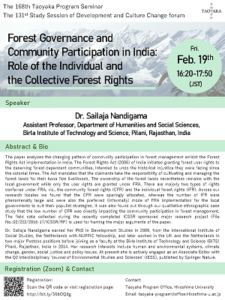(Feb. 19) Webinar: Forest Governance and Community Participation in India will be held
(Feb. 19) The 168th Taoyaka Program Seminar will be held
The 168th Taoyaka Program Seminar will be held on February 19th.
In this seminar, Dr. Sailaja Nandigama from Birla Institute of Technology and Science, Pilani will talk under the theme of Forest Governance and Community Participation in India: Role of the Individual and the Collective Forest Rights
Admission free and pre-registration is needed. We hope many of you attend the webinar.
■ Date: Friday, February 19, 2021 16:20-17:50 (JST)
■ Theme: Forest Governance and Community Participation in India: Role of the Individual and the Collective Forest Rights
■ Speaker: Dr. Sailaja Nandigama, Assistant Professor, Department of Humanities and Social Sciences, Birla Institute of Technology and Science, Pilani, Rajasthan, India
■ Language: English
■ Registration: (Zoom) http://bit.ly/36bOQ4g
■ Abstract:
The paper analyses the changing pattern of community participation in forest management amidst the Forest Rights Act implementation in India. The Forest Rights Act (2006) of India initiated granting forest user rights to the deserving forest dependent communities, intended to undo the historical injustice they were facing since the colonial times. The Act mandates that the claimants take the responsibility of cultivating and managing the forest lands for their bona fide livelihoods. The ownership of the forest lands nevertheless remains with the local government while only the user rights are granted under FRA. There are majorly two types of rights conferred under FRA, viz., the community forest rights (CFR) and the individual forest rights (IFR). Across our research locales we found that the CFR were sparingly allocated, whereas the number of IFR were phenomenally large and were also the preferred (informally) mode of FRA implementation for the local governments to suit their populist strategies. It was also found out through our qualitative ethnographic case study that the low number of CFR was directly impacting the community participation in forest management. The field data collected during the recently completed ICSSR sponsored major research project (File No.:02/252/2016-17/ICSSR/RP) is used for framing the major arguments of the paper.
■ Brief Bio of the Speaker:
Dr. Sailaja Nandigama earned her PhD in Development Studies in 2009, from the International Institute of Social Studies, the Netherlands with NUFFIC fellowship, and later worked in the UK and the Netherlands in two major Postdoc positions before joining as a faculty at the Birla Institute of Technology and Science (BITS) Pilani, Rajasthan, India in 2014. Her research interests include human and environmental systems, climate change, gender, social justice and policy issues. At present she is actively engaged as an Associate Editor with the Q2 interdisciplinary ‘Journal of Environmental Studies and Sciences’ published by Springer Nature. Dr. Nandigama provides her services as an editorial board member of a few international peer reviewed journals, as well as a reviewer of several Scopus indexed journals. She is a member of the Association for Environmental Studies and Sciences (AESS), USA, and Development Studies Association (DSA), UK.






